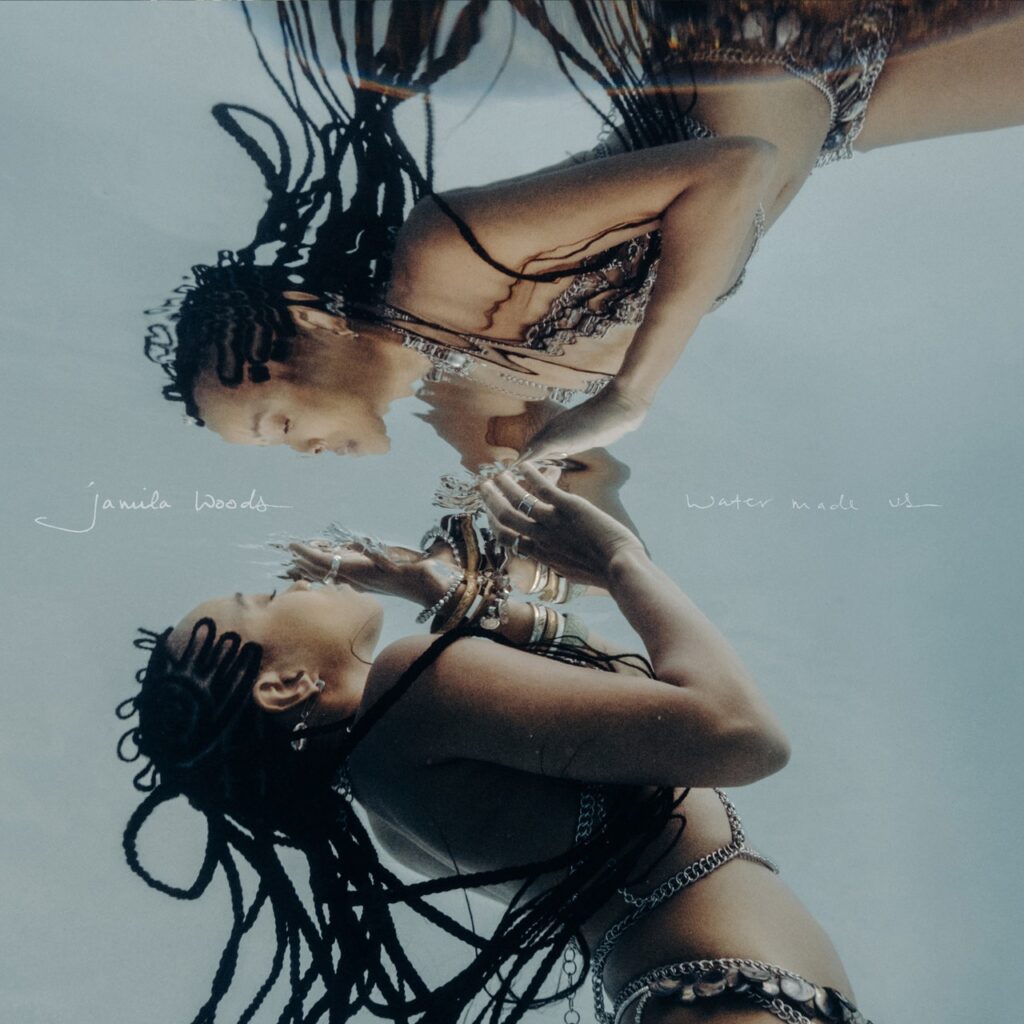How much would you let love change you? That’s the dare that singer and songwriter Jamila Woods tosses inside the circle on her sprawling new album Water Made Us. Across 17 songs, she considers love as a cell that can mutate and multiply, and she asks us to celebrate as she revels in its changes. It’s been four years since LEGACY! LEGACY!, an impatient bullhorn lofted by an artist urgent to set right historical slights. Since then Woods has been preoccupied by an inward metamorphosis, telling Them that she sought “to represent different stages of my life or relationships as a cycle.” While her earlier work sought to be definitive, here she’s fluid, tethered only to a personal philosophy of contentment and surrender. The musical inclinations and existential inquiries are curious and voracious, yet Woods keeps them sprightly and agile.
“Bugs,” the opener, is deceptively nonchalant in its pursuit of love. “Why not have pleasure on your way to the one/Or the second one?” Woods asks. Searching for “the one” can feel futile; she makes the task appear worthy, almost noble, less about finding and more about savoring. She also advises us to chill out: “Why so much pressure?” Jasminfire’s soaring violin gives the song a nursery rhyme quality that quickly turns hymnal, while drummer Homer Steinweiss turns the latter part of the song into a jazz session, trading fours to wind down the night. “Send a Dove” is smooth and melodic, in the vein of R&B heavyweights Mtume, and samples Nikki Giovanni’s far-reaching SOUL! conversation with James Baldwin. Giovanni talked to Baldwin about love, relationships, and the responsibility to show up for each other with gentleness, even when it’s difficult or untrue in the moment. “Fake it with me,” she implored. Woods continues that potent plea, singing, “Don’t save your worst for me/I’m not your leather Everlast… Lie to me still.” In conversation with her inspirations and contemporaries, particularly Kelela on Raven, Woods asks if her paramours are strong enough to do what love requires.
Songs like “Wreckage Room,” “Thermostat,” and “I Miss All My Exes” are candid with a hint of play. Woods speaks from her soul and makes life’s virtues—trust, faith, hope, memory—seem not just aspirational but necessary. Julian Reed’s piano lends an ominous air to the naked grief of the former two songs, while siblings Ayanna and Kamaria Woods’ choral harmonies on “Wreckage Room” evoke the familiarity and comfort of those we trust to carry us at our lowest: our family. The humor emerges as Woods revisits the quirks that made every past relationship similar yet different, remembering how it felt to be cared for by exes who “cook veggie burgers with Lawry’s, lemon pepper everything,” or those “who talk to God in a different language.”
Woods holds her own. Even better, she holds the team, ceding space to duendita and her Anita Baker tone on the triumphant “Tiny Garden” and to frequent collaborator Saba’s virtuosic rapping on “Practice.” Interludes—“let the cards fall,” “out of the doldrums” and “the best thing”—play like snippets of consciousness from the children on The Miseducation of Lauryn Hill, now grown up and ready to balance naivete with rational thinking. Standout “Wolfsheep” is a country-inflected ballad for the coconut oil kind of woman: Black girls who hike trails with Timbs and laid edges, remembering Sonia Sanchez and humming Summer Walker.
Woods brings irreverence, flexibility, and discipline to her writing, taking her time with each phrase and word placement. As a poet she needs to be clear, even if the lessons are uncertain. The steadfast quality of her lyricism brings to mind the pen games of others who have looked love squarely in the face and admitted it changed them: Carolyn Franklin, Stevie Nicks, SZA. This lineage of songwriters shares a fascination with the immediate aftermath of love—the morning after the breakup or the seconds following the revelation of infidelity. It’s not the sweeping emotions that compel them, but the moment in between separation and starting over.
Water Made Us is dextrous and steady. It conjures a profound sweetness from ordinary musings and takes the guile out of relationships. Woods gives herself over to a state of ease that is neither well-earned nor hard-fought, simply possible. Life will do as life does; all we can do is continue on until we arrive where we need to be. This is Woods’ realization on Water Made Us, and throughout, she sounds like she’s skipping: like she’s meeting love, time and again in various formations, and each time meeting herself anew.
All products featured on Pitchfork are independently selected by our editors. However, when you buy something through our retail links, we may earn an affiliate commission.

